For the 2025 school year, there are 5 public schools serving 879 students in Pine River-Backus School District. This district's average testing ranking is 4/10, which is in the bottom 50% of public schools in Minnesota.
Public Schools in Pine River-Backus School District have an average math proficiency score of 31% (versus the Minnesota public school average of 45%), and reading proficiency score of 46% (versus the 51% statewide average).
Minority enrollment is 8% of the student body (majority Hispanic and American Indian), which is less than the Minnesota public school average of 39% (majority Black and Hispanic).
Overview
This School District
This State (MN)
# Schools
5 Schools
2,732 Schools
# Students
879 Students
870,790 Students
# Teachers
70 Teachers
57,779 Teachers
Student : Teacher Ratio
13:1
13:1
District Rank
Pine River-Backus School District, which is ranked within the bottom 50% of all 522 school districts in Minnesota (based off of combined math and reading proficiency testing data) for the 2021-2022 school year.
The school district's graduation rate of 70-74% has decreased from 75-79% over five school years.
Overall District Rank
#342 out of 527 school districts
(Bottom 50%)
(Bottom 50%)
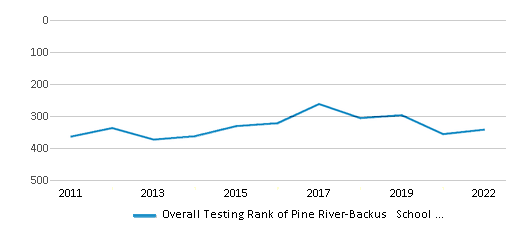
Math Test Scores (% Proficient)
31%
45%
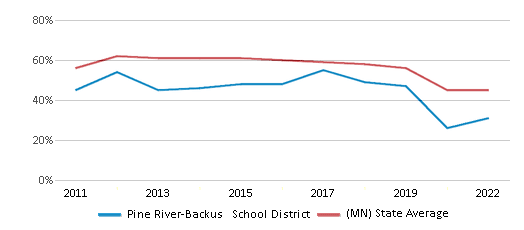
Reading/Language Arts Test Scores (% Proficient)
45%
51%
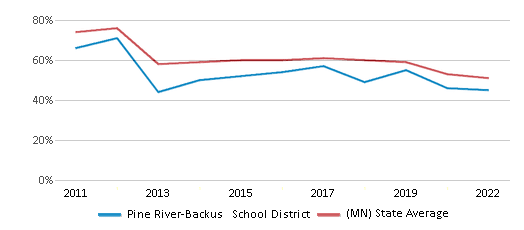
Science Test Scores (% Proficient)
42%
41%
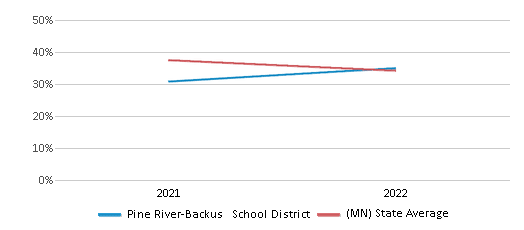
Graduation Rate
70-74%
84%
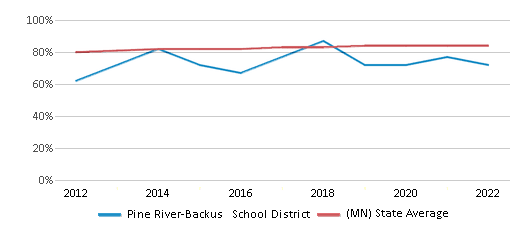
Students by Ethnicity:
Diversity Score
0.15
0.59
# American Indian Students
9 Students
15,699 Students
% American Indian Students
1%
2%
# Asian Students
8 Students
61,819 Students
% Asian Students
1%
7%
# Hispanic Students
13 Students
99,588 Students
% Hispanic Students
1%
12%
# Black Students
5 Students
102,736 Students
% Black Students
1%
12%
# White Students
811 Students
534,612 Students
% White Students
92%
61%
# Hawaiian Students
1 Student
1,007 Students
% Hawaiian Students
n/a
n/a
# Two or more races Students
32 Students
55,329 Students
% of Two or more races Students
4%
6%
Students by Grade:
# Students in PK Grade:
58
24,648
# Students in K Grade:
56
59,654
# Students in 1st Grade:
55
61,859
# Students in 2nd Grade:
62
63,560
# Students in 3rd Grade:
58
61,751
# Students in 4th Grade:
71
63,575
# Students in 5th Grade:
47
63,290
# Students in 6th Grade:
70
63,180
# Students in 7th Grade:
55
63,243
# Students in 8th Grade:
68
64,723
# Students in 9th Grade:
67
67,716
# Students in 10th Grade:
78
69,634
# Students in 11th Grade:
72
69,942
# Students in 12th Grade:
62
74,015
# Ungraded Students:
-
-
District Revenue and Spending
The revenue/student of $14,639 in this school district is less than the state median of $17,854. The school district revenue/student has stayed relatively flat over four school years.
The school district's spending/student of $14,299 is less than the state median of $18,580. The school district spending/student has stayed relatively flat over four school years.
Total Revenue
$13 MM
$15,547 MM
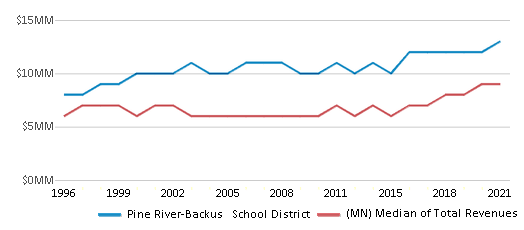
Spending
$13 MM
$16,179 MM
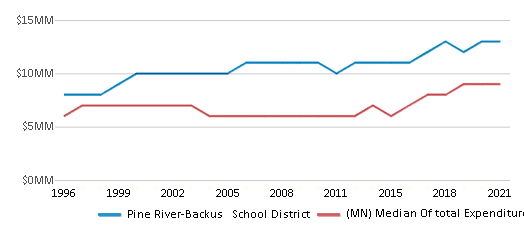
Revenue / Student
$14,639
$17,854
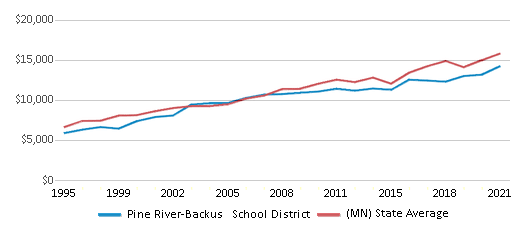
Spending / Student
$14,299
$18,580
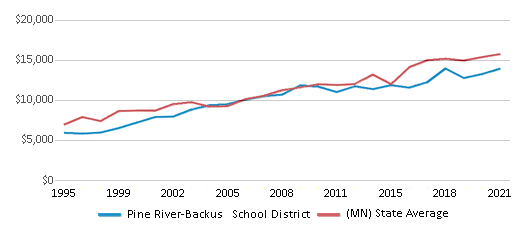
Best Pine River-Backus School District Public Schools (2025)
School
(Math and Reading Proficiency)
(Math and Reading Proficiency)
Location
Grades
Students
Rank: #11.
Pine River-backus Alp
Alternative School
(Math: <50% | Reading: <50% )
Rank:
Rank:
6/
Top 50%10
1000 1st St N
Pine River, MN 56474
(218) 587-3131
Pine River, MN 56474
(218) 587-3131
Grades: 9-12
| 50 students
Rank: #22.
Pine River-backus Midlevel Alp
Alternative School
(Math: <50% | Reading: <50% )
Rank:
Rank:
4/
Bottom 50%10
1000 1st St N
Pine River, MN 56474
(218) 587-3131
Pine River, MN 56474
(218) 587-3131
Grades: 7-8
| n/a students
Rank: #33.
Pine River-backus Elementary School
(Math: 30% | Reading: 49%)
Rank:
Rank:
4/
Bottom 50%10
401 Murray Ave
Pine River, MN 56474
(218) 587-4447
Pine River, MN 56474
(218) 587-4447
Grades: PK-6
| 477 students
Rank: #44.
Pine River-backus High School
(Math: 30-34% | Reading: 40-44%)
Rank:
Rank:
4/
Bottom 50%10
810 1st St N
Pine River, MN 56474
(218) 587-4425
Pine River, MN 56474
(218) 587-4425
Grades: 7-12
| 352 students
Rank: n/an/a
Prb Pequot Lakes Midlevel Alc
Alternative School
30805 Olson St
Pine River, MN 56474
(218) 568-9358
Pine River, MN 56474
(218) 568-9358
Grades: 6-8
| n/a students
Frequently Asked Questions
How many schools belong to Pine River-Backus School District?
Pine River-Backus School District manages 5 public schools serving 879 students.
What is the rank of Pine River-Backus School District?
Pine River-Backus School District is ranked #339 out of 522 school districts in Minnesota (bottom 50%) based off of combined math and reading proficiency testing data for the 2021-2022 school year.
What is the racial composition of students in Pine River-Backus School District?
92% of Pine River-Backus School District students are White, 4% of students are Two or more races, 1% of students are American Indian, 1% of students are Asian, 1% of students are Hispanic, and 1% of students are Black.
What is the student/teacher ratio of Pine River-Backus School District?
Pine River-Backus School District has a student/teacher ratio of 13:1, which is lower than the Minnesota state average of 15:1.
What is Pine River-Backus School District's spending/student ratio?
The school district's spending/student of $14,299 is less than the state median of $18,580. The school district spending/student has stayed relatively flat over four school years.
Recent Articles

Year-Round Or Traditional Schedule?
Which is more appropriate for your child? A year-round attendance schedule or traditional schedule? We look at the pros and cons.

Why You Should Encourage Your Child to Join a Sports Team
Participating in team sports has a great many benefits for children, there is no doubt. In this article you will learn what those benefits are.

White Students are Now the Minority in U.S. Public Schools
Increasing birth rates among immigrant families from Asia and Central and South America, combined with lower birth rates among white families, means that for the first time in history, public school students in the United States are majority-minority. This shift in demographics poses difficulties for schools as they work to accommodate children of varying language abilities and socio-economic backgrounds.





